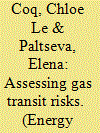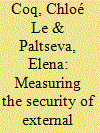| Srl | Item |
| 1 |
ID:
111457


|
|
|
|
|
| Publication |
2012.
|
| Summary/Abstract |
This paper proposes a Transit Risk Index (TRI) designed to assess the riskiness of pipeline gas imports and to study the effect of introducing new gas routes. TRI controls for gas dependency, transit route diversification, political risks of transit, pipeline rupture probability, and the balance of power between supplying and consuming countries along the transit route. Evaluating TRI for the EU-Russia gas trade, we show that the introduction of the Nord Stream pipeline would further widen already large disparities in gas risk exposure across the EU Member States. The gas risk exposure of the Member States served by Nord Stream would decline. In contrast, EU countries not connected to Nord Stream, but sharing other Russian gas transit routes with the Nord Stream countries, would face greater gas risk exposure. We discuss the implications of our analysis for the design of the common energy policy in the EU.
|
|
|
|
|
|
|
|
|
|
|
|
|
|
|
|
| 2 |
ID:
092615


|
|
|
|
|
| Publication |
2009.
|
| Summary/Abstract |
The security of energy supply is one of the main objectives of EU energy policy. In this paper, we introduce an index designed to evaluate the short-term risks associated with the external supply of energy to the EU Member States. It combines measures of energy import diversification, political risks of the supplying country, risk associated with energy transit, and the economic impact of a supply disruption. We construct separate indexes for three primary energy types, oil, gas and coal, and demonstrate that Member States' levels of supply risk exposure differ across energies. Most other studies of this kind provide aggregate indexes combining different types of energy. Our results suggest that an aggregate approach could be misleading, at least for discussions of the short-term response to risks. We discuss the implications of our findings for the common energy policy.
|
|
|
|
|
|
|
|
|
|
|
|
|
|
|
|